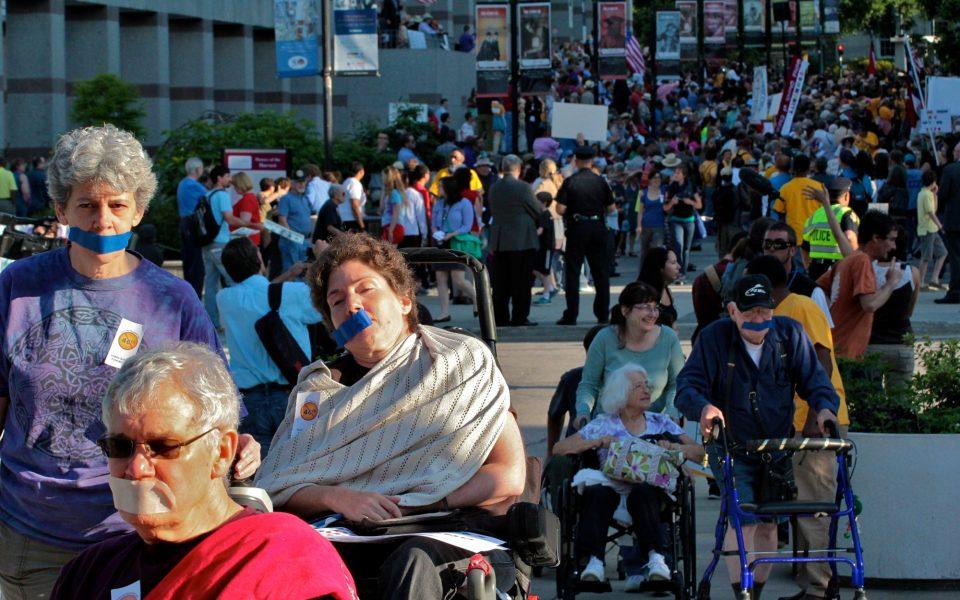by Kirk Ross
 They entered the building from the Jones Street side two-by-two, as has been the custom since the start of the protests.
They entered the building from the Jones Street side two-by-two, as has been the custom since the start of the protests.
And like other times, leading the way into the building were the people in wheelchairs and scooters or using walkers.
But marking this Moral Monday, the first of the 2014 session, was the quiet and the simple stark images of a few dozen older North Carolinians moving silently into the legislature with their mouths taped shut.
I’m not sure how it came across via satellite, but close up, where you could hear the whirr of the scooters and the sound of people’s feet as they crossed the state seal with its promise of truth and bounty, it was powerful.
Yes it was theater. Find me something political that isn’t.
Last week in the same building a committee that hadn’t met since 1999 got together and changed the rules for visitor conduct, the first they’d been changed since 1987. There was no debate, no chance for the public to say something.
One section seemed to outlaw a pretty common practice of the press: “No person, other than officers and members of the General Assembly, may have a press or news conference in the State Legislative Building or the Legislative Office Building. An interview among two individuals shall not be considered a press conference.”
Under those rules, interviews between a couple of reporters and policy experts, advocates and others who aren’t officers and members would be a violation.
The big clampdown came in the area of visitor rules and in a quick afternoon it was deemed a violation — a Class 1 misdemeanor — to make any noise “loud enough to impair others’ ability to conduct a conversation in a normal tone of voice while in the general vicinity and may include singing, clapping, shouting, playing instruments.”
In other words, be silent.[pullquote]Last week in the same building a committee that hadn’t met since 1999 got together and changed the rules for visitor conduct, the first they’d been changed since 1987. There was no debate, no chance for the public to say something.[/pullquote]
So, on Monday as the crowd moved through the legislature there was silence as people walked up the stairs to the galleries and circled around the railing where last year crowds watched as 941 people committed acts of civil disobedience and were arrested. They filed back down the stairs and through the halls and this time did not ascend to the second floor to stand at the doors to the House and Senate chambers. Instead, they walked on outside and far away, down to the opposite end of Halifax Mall.
The group was so large it took more than an hour for the procession to make its way through the building. They interrupted little of the workings of the place. The speaker of the House was in our nation’s capital raising money for his US Senate campaign. No one said where the leader of the Senate was. Both chambers held quick, sparsely attended sessions to read in a few bills and called it a day.
Outside, the crowd regrouped, the tape came off and they made some noise.
“We will never be silent again!” the Rev. William Barber shouted repeatedly as the din rose.
There were no arrests, no chanting as the buses rolled out to Wake Detention Center, and by the time the sun started to set in Raleigh, the crowd went away and the quiet returned.
The reaction was mixed as you might imagine: a hugely symbolic victory to some, a failed stunt to others. Up close, it was intense. Probably not so if you only saw it on your phone.
It’s not the end, though. And the crowds coming next week aren’t likely to be so silent. There’s a consensus in the civil rights legal community that, despite the assertions by legislative leaders, the new rules won’t stand a constitutional challenge.
You know how that kind of thing gets settled.
Join the First Amendment Society, a membership that goes directly to funding TCB‘s newsroom.
We believe that reporting can save the world.
The TCB First Amendment Society recognizes the vital role of a free, unfettered press with a bundling of local experiences designed to build community, and unique engagements with our newsroom that will help you understand, and shape, local journalism’s critical role in uplifting the people in our cities.
All revenue goes directly into the newsroom as reporters’ salaries and freelance commissions.


Leave a Reply